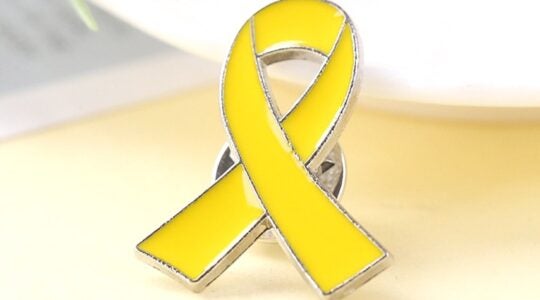WASHINGTON (JTA) – Marla Gilson found out in January that she had acute leukemia.
By March, she learned that her disease had cost her not only her good health, but her job leading an advocacy group for the Jewish aged.
In quick succession, friends, colleagues and acquaintances in Washington’s Jewish activist community rallied to Gilson’s bedside to support her in her fight with her employer — the Association of Jewish Aging Services — and also to champion a wider cause: registering Ashkenazi Jews as potential bone marrow donors.
Gilson, a Capitol Hill presence for decades with stints working for Hadassah, the American Israel Public Affairs Committee and several Democratic Party campaigns, told friends she did not want a tribute. Instead, she said, she wanted to alert Jews to the need to register with Gift of Life, the national bone marrow registry.
“She was happy to raise the issue,” said Laura Cutler, who heads the Israel studies program at American University and serves on the boards of several Jewish family foundations. “We saw it as a way to get more Jewish potential donors.”
A bone marrow match was found for Gilson, who is now in remission. She is scheduled to undergo a bone marrow transplant next month.
Gilson declined to be interviewed for this story, but friends and colleagues who talked to JTA offered details of Gilson’s fight against the Association of Jewish Aging Services and talked about how Gilson’s illness had inspired them to support the cause of bone marrow donor registration.
Gilson long has been known in Washington for her advocacy work for federally funded stem cell research and for banning the use of genetic information in employment. As director of Hadassah’s Washington office, she usually was in the room when presidents met with Jewish leaders; her last such meeting was with President Obama in July 2009. That meeting came not long after Obama signed an executive order earmarking funds for stem cell research – something that Gilson had spent the better part of her career advocating for.
Within months, however, Hadassah was reeling from its losses as a victim of Bernard Madoff’s Ponzi scheme and, with the organization in financial distress, Gilson lost her job.
She was soon hired as president and CEO of the Association of Jewish Aging Services, an umbrella body for homes for the aged in the United States and Canada. Within six months, Gilson was preparing a budget for the organization and was well on her way to organizing a conference in Dallas that took place this week. The association’s board of directors applauded her work, calling her prompt and effective.
After she learned of her illness and began chemotherapy, Gilson asked the association’s board if she could work from home because she was vulnerable to infection. She promised to return to work by Sept. 1 — the date by which she now expects to be sufficiently recovered from her bone marrow transplant.
However, according to email exchanges obtained by JTA, the board balked, saying Gilson’s job was too critical to do from home.
“Your proposal, if accepted, would pose undue hardship to our organization,” an email from the board stated, noting that board members had been filling in for many of her duties since she became ill.
The emails show that Gilson offered to dedicate part of her salary to a consultant who would fill in the gaps until she returned to the job, but the Association of Jewish Aging Services said no.
“We cannot dedicate the same time until you return or while a temporary consultant, assuming one could be recruited and engaged, becomes familiar with our issues, members, industry, partners, etc.,” an email from the board stated.
The Association of Jewish Aging Services board declined a request for comment on this story.
The organization informed Gilson that she would be terminated as of April 26, but promised to rehire her if no replacement had been found by the time she recovered.
Last week, the board told the association’s members that it was searching for a new president.
The same friends who had rallied to Gilson’s side when she learned she was ill – sitting at her hospital bedside, making meals for her family – are now consulting daily on strategies for confronting the Association of Jewish Aging Services and forcing it to keep her on. One friend offered the services of her labor lawyer husband, who has argued that basing a dismissal on a prognosis may amount to discrimination. No lawsuit has been filed.
“I don’t know how you treat anyone like this, never mind someone you know and love,” said Steve Rabinowitz, a former Clinton administration communications official who now runs a policy and public-relations shop for Jewish and liberal groups.
For Gilson’s friends and colleagues, the fight for her job is their second battle on her behalf. Almost as soon as Gilson went public with her illness, they launched a campaign to find her a bone marrow match.
On Feb. 25, a group of Jewish notables across the country sent around a letter about Gilson’s illness, urging Jews to register as potential bone marrow donors.
“Hundreds and hundreds of women who participated in Hadassah’s Day on the Hill were empowered and touched by Marla’s determined advocacy in our victory for the right to genetic non-discrimination and stem cell research,” the letter stated. “It is now our turn to rally and advocate for Marla – and we urgently need your help.”
As it turned out, by the time the screenings started, a bone marrow donor already had been identified for Gilson. Rather than directly assisting her, the screenings became a way to honor her and her career.
Jewish groups in New York and Washington responded to the call. Bone marrow donor registration drives — which involve getting the inside of the potential donor’s cheek swabbed so a sample can be tested — were held at Hadassah headquarters in New York, at Purim parties in Washington, at the Washington D.C. Jewish Community Center and at the K Street headquarters of several national Jewish groups.
At the K Street drive, organized by Jennifer Laszlo Mizrahi, founder of The Israel Project and a friend of Gilson’s, 48 people registered as donors over the course of two hours.
“She would walk on hot coals for the Jewish people, and she has never been shy about speaking out on behalf of others,” Mizrahi said of Gilson. “So if I can do something small to have some ability to help her, it’s only my honor to do so.”
Cutler of American University told JTA that the destruction of so many Ashkenazic bloodlines in the Holocaust makes the likelihood of finding a bone marrow match “like finding a needle in a haystack.”
Cutler added that she was aware of the bone marrow issue because of years of advocacy by Gilson and others, but it was different now that a close friend was suffering. “It became a very concrete thing to me,” she said.
The last major, community-wide bone marrow registry drive among Washington-area Jews was in 1989, when a young Jewish woman, Allison Atlas, was diagnosed with leukemia. Atlas was only 20 when she was diagnosed, and she died soon afterward, but her struggle drew massive interest and led to the registration of many potential donors. But, more than two decades later, many of those registered donors are now 60 years of age or older – the maximum age for joining the national registry.
JTA has documented Jewish history in real-time for over a century. Keep our journalism strong by joining us in supporting independent, award-winning reporting.





